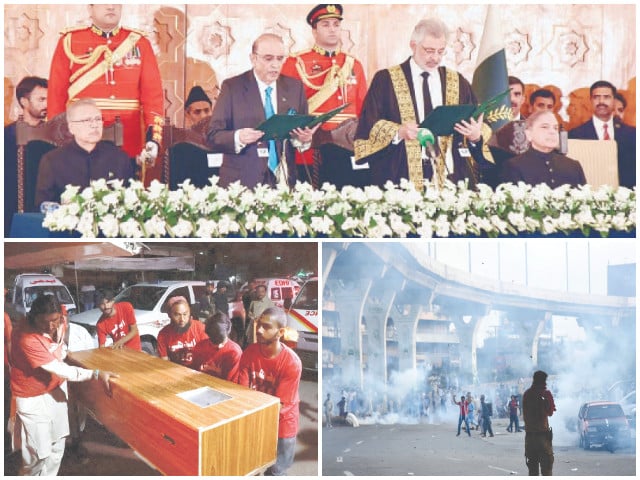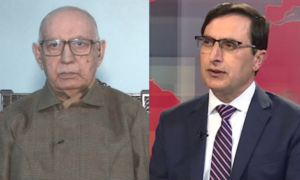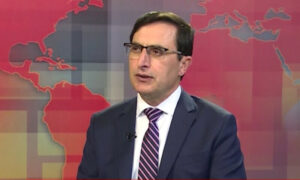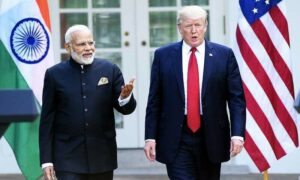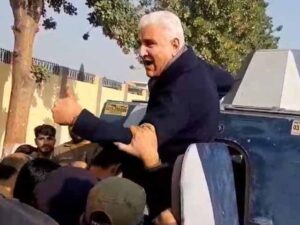ISLAMABAD:
The year 2024 proved to be a politically charged and transformative one for Pakistan, dominated by the general elections, significant legislative changes, judicial reforms and a persistent standoff between the PML-N-led government and the opposition – PTI. While some moments signaled progress, others underscored the growing tensions and unresolved conflicts that have kept the political temperature high.
Throughout the year, the political landscape grew increasingly polarised, divisions kept deepening between the ruling coalition and opposition parties and PTI continued to challenge the legitimacy of the electoral process, formation of the government and the subsequent legislative changes. The government’s legislative push, particularly judicial reforms, not only changed the entire process of choosing the chief justice of Pakistan but led people to say that judiciary’s wings were clipped.
The legislation regarding extension in army chief’s tenure briefly raised many eyebrows but it didn’t go beyond that. With each passing month, political dramas played out on multiple fronts: from fiery speeches in Parliament to high-stakes legislation and from protests to crackdowns. The ruling coalition and opposition parties remained engaged in an ongoing battle of narratives and it kept the public on edge.
Like previous years, political & economic instability, law & order situation, judicial independence, electoral integrity and military influence remained at the forefront. It seemed uncertainty was the only certain thing on the restive political scene.
General Elections
Though general elections had to be held in 2023, they were finally conducted on February 8, 2024, re-setting the stage for the year’s political drama. Allegations of rigging and manipulation overshadowed the electoral process with accusations ranging from pre-poll rigging to post-poll irregularities. Despite these claims, the PML-N coalition emerged victorious and formed a coalition government, paving the way for Shehbaz Sharif’s re-election as Prime Minister. The coalition government brought PML-N, PPP, MQM-P and others together to create yet another hung parliament, highlighting the fragile nature of Pakistan’s democratic & political landscape.
ECP & reserved seats
The Election Commission of Pakistan (ECP) found itself at the center of controversy before, during and after the general elections. Its decision to strip the PTI of its electoral symbol ahead of the polls drew sharp criticism and accusations of bias. Delays in announcing the election results further fueled suspicions of irregularities, with many questioning the transparency of the process.
The unresolved issue of reserved seats added another layer of complexity. The Supreme Court’s suspension of these allocations left the ruling coalition without a two-thirds majority. The ECP initially failed to settle the issue and then literally became a sandwich between the Supreme Court and Parliament as the top court ordered one thing while Speaker NA sought another from the poll body, resulting in stalemate till now. This impasse which left the ECP caught between the judiciary and the legislature eroded its credibility and led to increasing political tensions. The year underscored the urgent need for institutional reforms to restore confidence in the electoral process.
Key legislative changes
Two key legislative actions defined the political narrative in the latter half of 2024. In November, Parliament passed a bill extending the army chief’s tenure from three to five years. The move was seen as consolidating military influence in the country’s politics but only managed to draw limited reactions from political parties and observers.
The second one was when the 26th Amendment was enacted. Apparently, this amendment clipped the judiciary’s wings, curtailing its powers in an effort to address what the ruling coalition described as “judicial overreach.” The legislation triggered debate with opposition arguing that it undermined the independence of the judiciary while the supporters hailed it as a step toward restoring balance among state institutions.
Sharif and Zardari’s returns
Nawaz Sharif’s return to politics, beginning late last year, has been marked by a surprisingly low profile. The former premier, who once dominated Pakistan’s political landscape, stepped out of the limelight after unexpectedly announcing that he was no longer in the race for the premiership. In contrast, Asif Ali Zardari’s political resurgence culminated in his return to the Presidency for a second term.
President Zardari’s comeback wasn’t straightforward as his son, PPP chairman Bilawal Bhutto Zardari, had to quit his race to PM house because the PML-N and PPP had decided to divide key constitutional offices between them and, as a result of it, the presidency went to PPP while PM office to PML-N, among other offices.
PTI’s struggle & legal battles
The year proved especially challenging for PTI leaders and workers. From the incarceration of its founding chairman Imran Khan to the arrests of key leaders and a sustained crackdown on its supporters, the party faced relentless pressure.
The incarceration of Imran Khan remained a focal point throughout the year. His detention, amid a barrage of legal challenges, showed how a civilian ruler once again ended up behind bars after ruling the country – a tradition going on for years. The May 9 investigations and subsequent sentences by military courts further intensified the situation, leaving PTI struggling to regroup and maintain its political space.
Behind the scenes
Behind the scenes, from political parties to commentators, all know and admit that the influence of powerful stakeholders continued to shape the political landscape. Allegations of their involvement in election outcomes, legislative priorities and even opposition crackdowns were rife throughout the year but no one has ever been able to substantiate the claims. The role of unelected institutions having significant sway over Pakistan’s democratic scene is an open secret and, just like past, 2024 ended without making any changes to this perception.
Parliament desecrated
One of the darkest moments of 2024 occurred when officials of law enforcement agencies stormed the Parliament building to arrest PTI lawmakers. Total 10 PTI MPs were arrested – after being dragged and bundled up in vehicles – from the Parliament House on September 10 and charged with the protest and anti-terrorism laws. To add insult to injury, the power supply was disconnected to make final round of arrests that night.
For a moment, NA speaker was compelled to say that he was thinking if he should be in the chair anymore after being blamed for his alleged role in attack on Parliament but then decided to suspend a few low-ranking officials with a promise to conduct an in-depth inquiry, whose report hasn’t yet been made public.
November standoff
Tensions escalated again in November when a standoff between PTI protesters and government forces turned violent. The government denied any fatalities but PTI claimed that a dozen of its workers were killed in Capital’s Blue Area, with scores injured on November 26. The incident is still a flashpoint between the two sides, with both sides claiming that the other side was simply lying.
December negotiations
Nevertheless, in a rare moment of potential reconciliation, December saw the initiation of formal talks between the government and PTI. With a self-imposed deadline of January 31, 2025, PTI wishes to resolve the longstanding issues. However, given PTI’s demands; that judicial commissions be constituted on May 9 and November 26 and all PTI workers and leaders, including Imran Khan be released; as well as the turbulent history, skepticism remains about the likelihood of a breakthrough. It has further aggravated after jailed PTI leader Imran Khan conveyed that talks and his call, as part of civil disobedience movement, to overseas Pakistanis that they shouldn’t send remittances will go hand-in-hand – a combo that the government side dislikes and earlier demanded to change.
Year of uncertainty
The events of 2024 have left an indelible mark on Pakistan’s political landscape. It was the year of transition of power with high hopes that the dynamics of governance will change. Yet, as the year draws to a close, the political climate remains loaded with uncertainty. The unresolved issues and deep-seated divisions suggest that 2025 will inherit a nation still grappling with the fallout of its turbulent past year.

